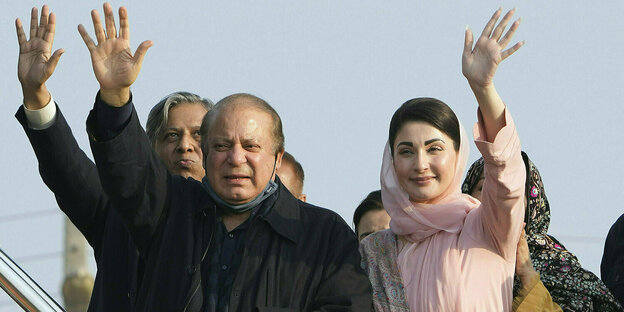The elections in Pakistan are taking place in an increasingly turbulent regional constellation. Concern for stability unites China, India and the West.

Pakistan's former Prime Minister Nawaz Sharif and his daughter Maryam Nawaz greet their supporters. Photo: KM Chaudary/ap
MUMBAI taz | In reality, Pakistan has enough other things to worry about. But in the midst of the electoral campaign and the economic crisis, the country cannot calm down. On the eve of elections in Pakistan, at least 28 people were killed in bomb attacks at polling stations in the southwestern province of Balochistan, including Pishin, 100 kilometers from the border with Afghanistan. In the previous days there had been new attacks in the province of Khyber Pakhtunkhwa.
Niels Hegewisch, who heads the SPD-affiliated Friedrich Ebert Foundation in Pakistan, does not believe that the fact that the security situation in Pakistan has deteriorated in recent years is directly related to the elections. He refers to events in neighboring Afghanistan. Since the Taliban took power there in August 2021, the number of attacks in the border area has been increasing. With the seizure of power, the Pakistani branch of the Taliban also strengthened.
In 2023, almost 1,000 people were killed in terrorist attacks in Pakistan. The Pakistani military is increasingly losing control of the border to militant groups in Afghanistan. The local branch of the “Islamic State” (IS) and the Pakistani Taliban (TTP), among others, are causing unrest.
Instability in the region is reflected in increasing flows of refugees. As of October 2023, according to UNHCR, there were 3.7 million Afghans living in Pakistan, including 700,000 who fled after the Taliban came to power. Last year, the Pakistani army deported almost half a million Afghans to curry favor with the local population.
Violence with India has decreased, at least somewhat
There are also growing conflicts on the border with Iran. In January, a dispute escalated militarily. Both states accuse each other of supporting separatists. They lay down their weapons after the rocket attacks, but claim they only killed their own citizens. The losers of the conflict are the civilians.
Chinese infrastructure projects have become one of the main targets of the Baloch resistance. The separatists see their own interests at risk due to the close cooperation between Pakistan and China. From the Chinese perspective, Pakistan plays a key role in the success of the New Silk Road. Among other things, it connects the port of Gwadar in Pakistan with the Chinese province of Xinjiang.
“An election victory for Nawaz Sharif could be beneficial for the West as he is more diplomatically pragmatic and will likely seek closer relations with the United States and Europe,” says Farhan Zaheer. He points out that Sharif also has good relations with China and Saudi Arabia. An unstable nuclear power, Pakistan, benefits neither the West nor China.
In at least one respect the situation has calmed down recently: Violence with India has decreased, says South Asia expert Michael Kugelman. “Ironically, the border between Pakistan and its bitter rival India is calm thanks to a 2021 ceasefire,” he says. But the conflict over Kashmir has not been resolved. Pakistan continues to protest against the Modi government's withdrawal of autonomy from the Indian part of Kashmir in 2019. Tensions also rose over Pakistani accusations that India had carried out targeted attacks in Pakistan.